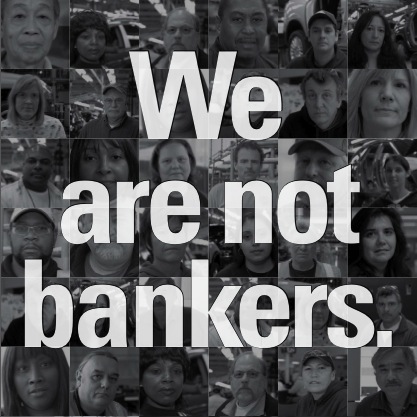Auto Workers Make Case for Bailout
Nearly a month after the executives of the Big Three automakers arrived in Washington on corporate jets to ask Congress for a bailout, a group of auto workers made the same trip by carpool. Their mission was the same, but the blue-collar image they projected was strikingly different.
Jul 31, 2020468 Shares467.9K Views
This United Auto Workers advertisement printed in The New York Times on December 3 was accompanied by text that described the auto industry crisis as a Main Street issue, not a Wall Street one. (uaw.org)
When the chief executives of the Big Three automakers first came to Washington to ask Congress for a $25 billion-bailout, they arrived in town on private jets.
When 16 active and retired members of the United Auto Workers headed to Washington on Sunday night to press the need for government help, they drove the 500-plus miles from Detroit in four American-made cars.
Dressed in baseball caps and UAW T-shirts and showing signs of fatigue after the nine-hour drive, the workers appeared at a press conference Monday morning on Capitol Hill to make their case for government assistance. The blue-collar image these members of the Auto Workers Caravan projected contrasted sharply with that of the well-heeled auto and Wall Street executives who had preceded them.
Illustration by: Matt Mahurin
It helped to underscore the difference between how they see the proposed bailout of the auto makers and that given Wall Street. Taxpayer money wouldn’t go to highly paid managers and executives, as it did on Wall Street. Instead, it would be a temporary loan to keep their industry afloat through the economic crisis and protect the jobs of rank-and-file American workers.
“The [auto] companies are asking for a fraction of the money that was given to Wall Street,” said Bill Alfred, president of UAW Local 35 and a member of the Auto Workers Caravan. “They’re only asking for a loan — not a free gift, not a free ride. They want to get this money to protect the industry and pay it back [to taxpayers]. … Those folks from Wall Street came and asked for money for free.”
UAW member Tony Browning emphasized that the money would be paid back to taxpayers once the companies get past the current economic downturn. “I work for the Chrysler corporation,” Browning said. “And we’ve been through this before, in 1979. … We got a loan in ’79, and we paid it back in record time, plus interest and everything. So that shows our credibility.”
During the debate over whether to bail out the car manufacturers or allow them to fall into bankruptcy, some lawmakers have blamed the UAW for the financial struggles of General Motors, Ford and Chrysler. They say that workers’ overly generous wages and benefits have drained the companies’ resources and made it difficult for them to compete with manufacturers overseas. These union critics want concessions from the UAW as a precondition for any bailout.
Union leaders, not surprisingly, reject the notion that concessions are needed. “Talk of more givebacks by our union ignores the cuts we made just one year ago, when our union agreed to a 50 percent wage cut, down from $28 an hour to $14 an hour, and no pensions for new hires,” said Hammer. “Reducing our quality of life would have a ripple effect on our entire economy, and would just make things worse. The reality is that our labor constitutes just 8 percent of the price of a new car. We could work for free, and it wouldn’t solve the crisis.”
UAW local president Alfred rejected calls by some lawmakers for the ouster of GM CEO Rick Wagoner as part of any bailout. No such demands were made of the financial industry as a condition for receiving taxpayer money, he noted.
“General Motors, Ford and Chrysler are asking for $34 billion, and [some lawmakers] want to remove the executive of General Motors. So how many people do they want to remove from Citigroup for wanting, what is it, $400 billion? I’m thinking that’s a lot of floors they’re gonna have to clear in that building. So before they start calling for resignations, they’ve got to check what they’ve already done and correct that situation.”
It is not every day that the UAW defends the management of a Big Three company. Yet the automakers’ dire emergency has brought the leadership of the UAW and the companies to the same table at congressional hearings to plead for help. “At this point in time, we agree with the auto industry executives that yes, they need the bridge loan, that yes, they are truly in financial difficulty at this point in time, and therefore that the government needs to intervene,” said former UAW Local 235 president Wendy Thompson. “We agree on that question.”
But the auto workers made sure to hammer home their contrasts with the executives. “We didn’t fly here in our jets,” said Chrysler employee Browning. “We left them at home.”

Hajra Shannon
Reviewer
Latest Articles
Popular Articles

